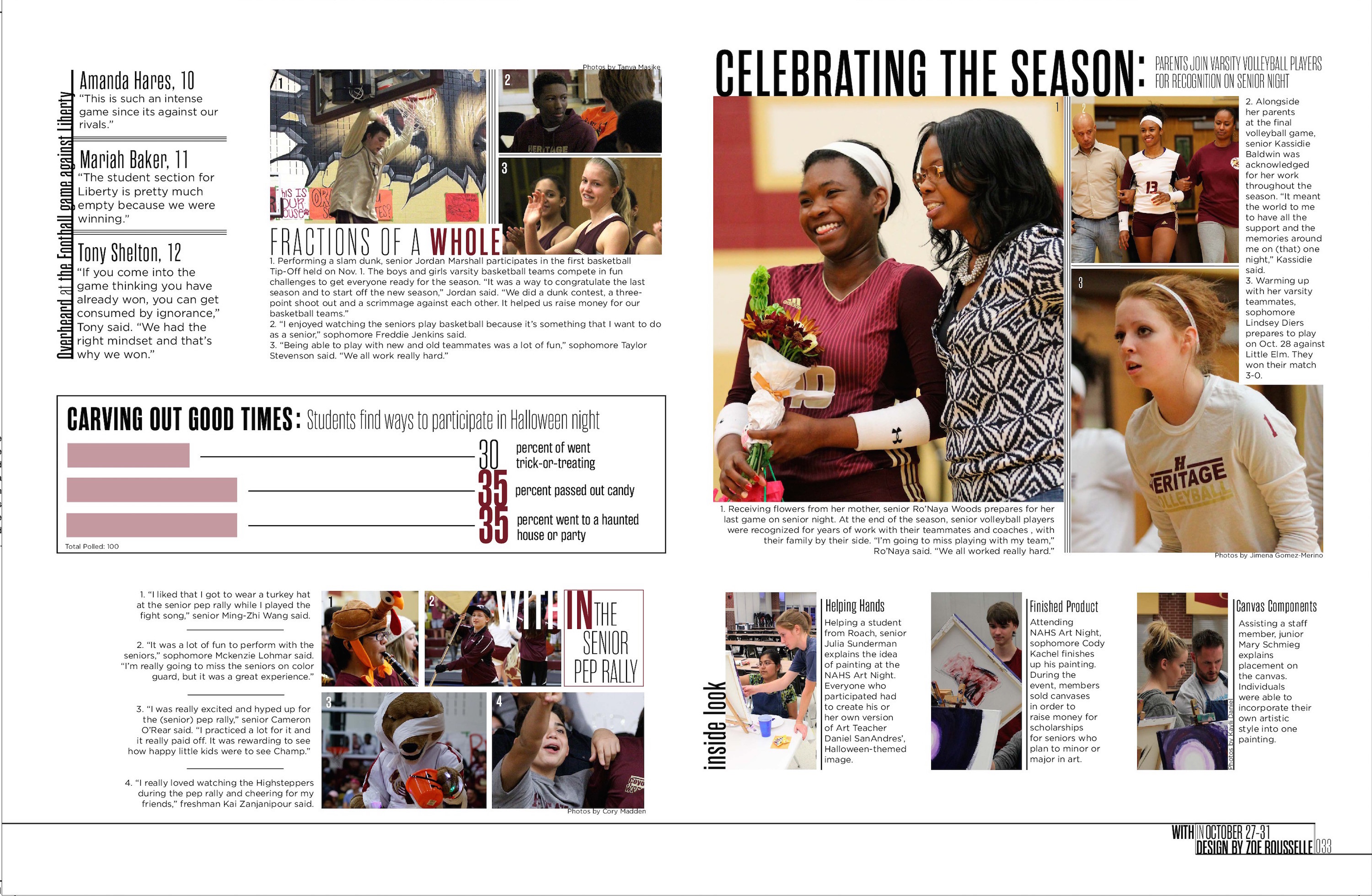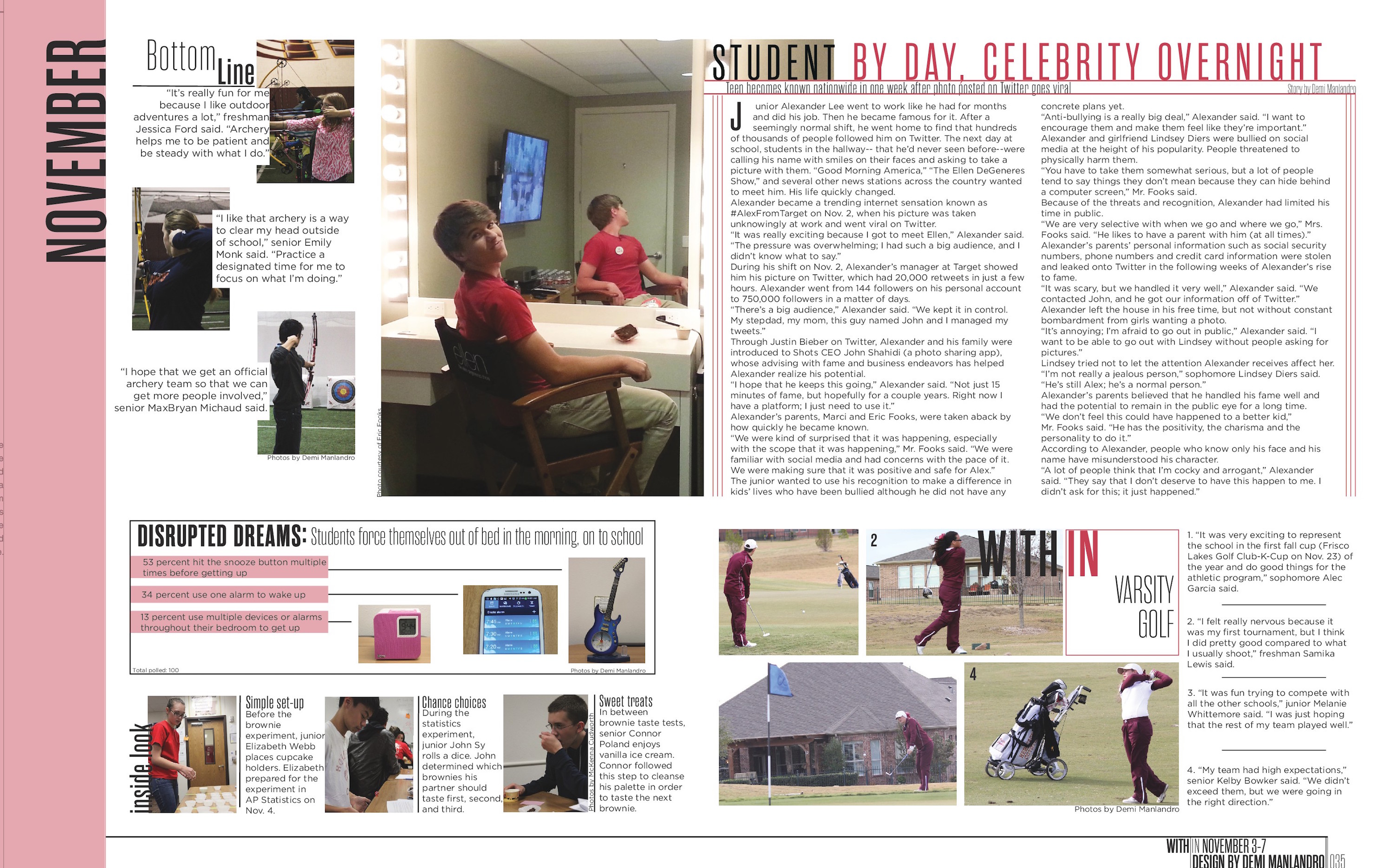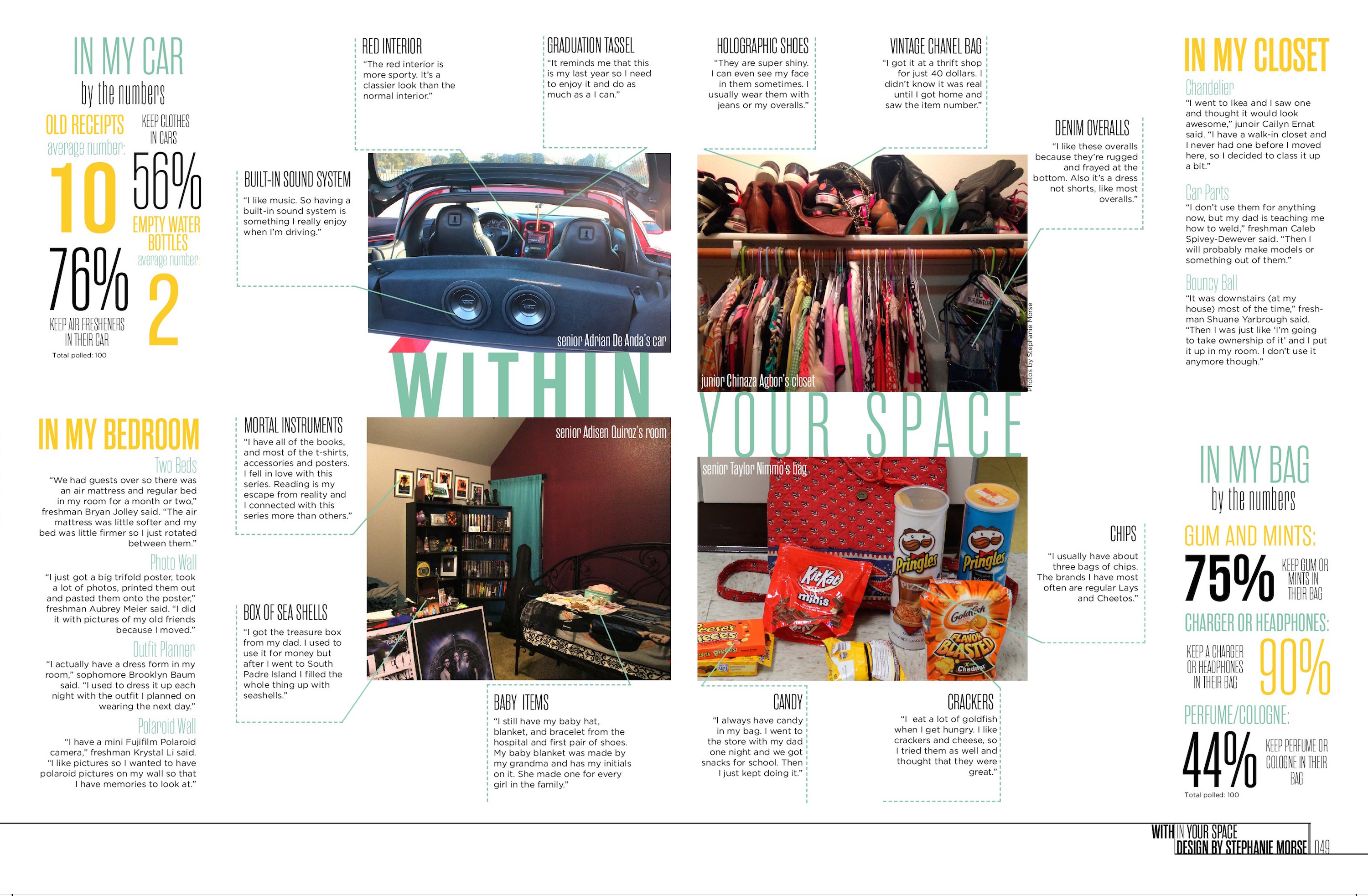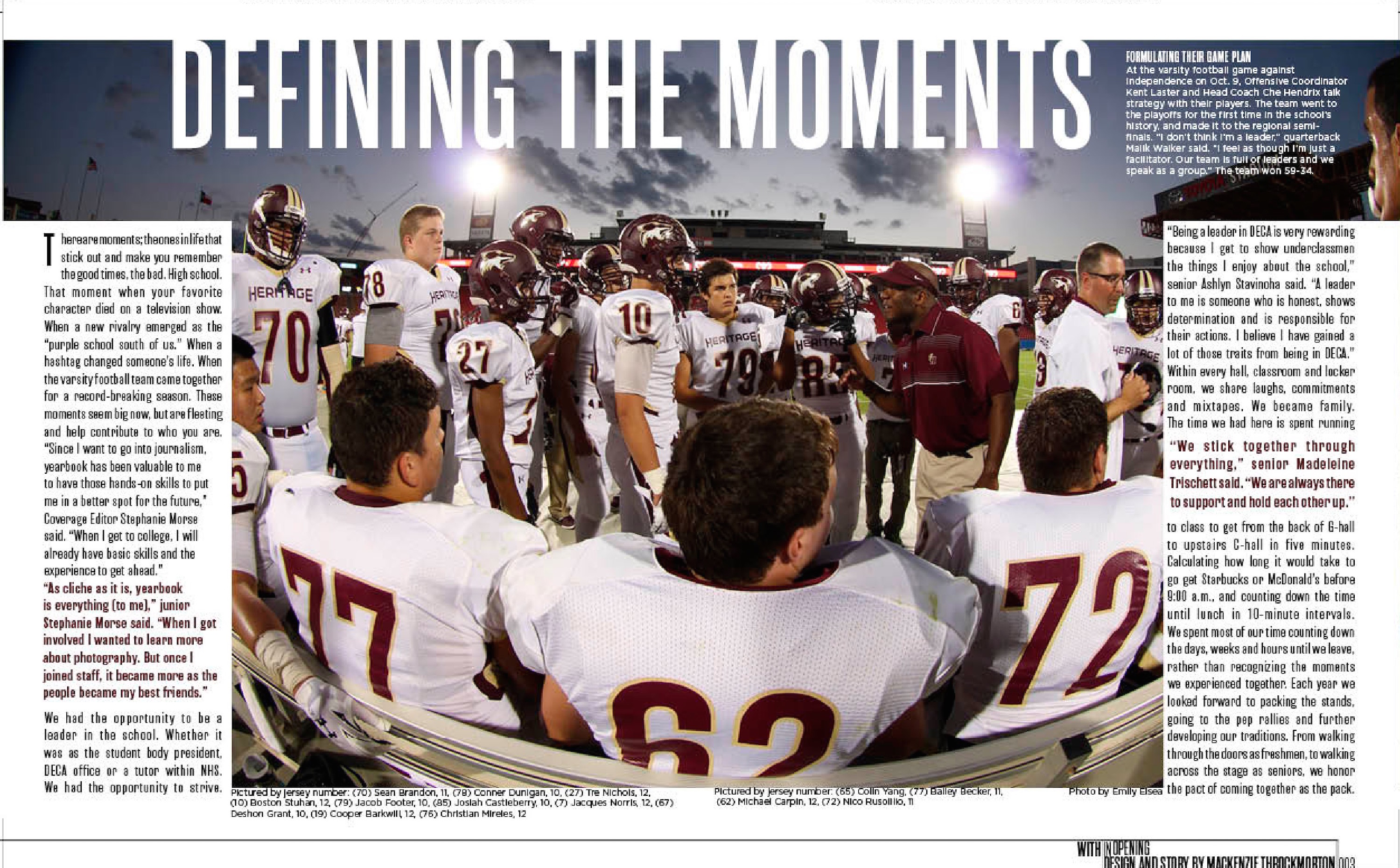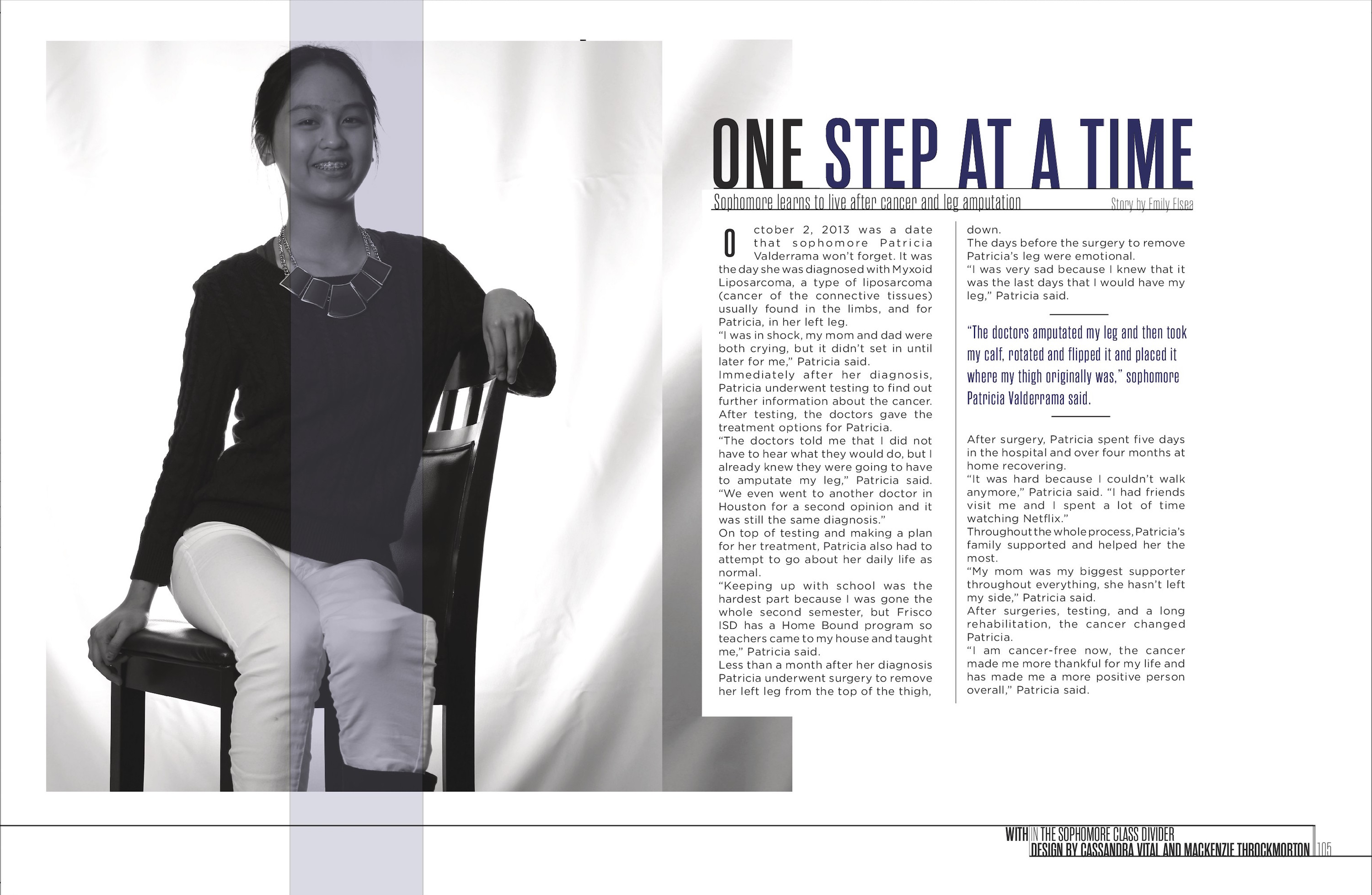The Tribute, Yearbook
Heritage High School
Each year, the National Scholastic Press Association recognizes excellence in student media with scholastic journalism’s preeminent award, the Pacemaker. Pacemakers are awarded in each category of publication — online, newspaper, yearbook, magazine and broadcast.
Teams of media professionals judge entries based on the following criteria: coverage and content, quality of writing and reporting, leadership, design, photography and graphics.
NSPA contacted Rebecca Pollard, adviser of 2015 Yearbook Pacemaker recipient The Tribute, for a Q&A. The Tribute is the yearbook of Heritage High School in Frisco, Texas.
NSPA also heard from Stephanie Morse, the Tribute’s coverage editor.
NSPA: Tell us a little bit about the editors and staff of your Pacemaker-winning publication.
Rebecca Pollard, adviser: We had 10 editors that made up the editorial board. There were 15 staff members, some with one year of experience, many who were rookies.
NSPA: How did the staff ensure the quality of the publication?
RP: We devised a step system for quality checks. It was 10 steps last year. Our goal was to get as many eyes on our pages as we could.
NSPA: What were the goals going into last year and how did you ensure those goals were met?
Stephanie Morse, coverage editor: Last year the editorial board wanted to focus on writing and coverage. To improve our writing skills we participated in a writing workshop during the summer and also focused on developing a theme and modules that would lend itself to in depth reporting. The focus of our theme was to highlight the individual and to gather more personal stories from the student body, which helped us continue to place an emphasis on writing and reporting throughout the year.
As coverage editor, I maintained an Excel document with all the classes, clubs, organizations and sports teams to monitor coverage and ensure all groups were represented as equally as possible. I held meetings with staffers to assign coverage and worked with our photo editors to ensure photographers were going to all the necessary photo events. We also closely monitored how many times each individual was covered to try to include as many people in the book as possible.
NSPA: Is there any one issue, story or package that stood out during the year?
RP: Yes, the #AlexfromTarget phenomenon started in our city. Alex Lee was a student at our school at that time. He worked at a local Target, went to work one day and the hashtag made him famous overnight. It was weird to us. But as he grew in nation-wide popularity, we knew it was important to cover.
The reporter assigned to the story was so careful in her coverage. She wanted to get the story right. Our initial idea was to publish the long version of the story on our online site, but as time went on, and how the story developed, we couldn’t find the place to edit the story. After the reporter, a few editors, and her adviser looked over the piece, we were stumped on where to trim for yearbook. We decided to go ahead and publish the whole piece. We were all very proud of the work the reporter did on that story. She stuck to it, and ensured she got it right.
NSPA: Tell us about a hardship or obstacle you felt your staff overcame:
RP: We had a few leadership ethical issues that popped up throughout the year. As much as I tried to impress upon the editorial board to lead by example, that didn’t seem to stick with all the members. It created a divide among the editors, which did trickle down to the staff.
Luckily, the book was the one thing that united us. When we were overwhelmed with our deadline work, everyone stayed focused. It taught the ones returning they must lead by example, but they wanted the new staff to know they were valued and included. Not that the 2014-2015 editorial board didn’t do that as well. But the 2015-2016 editors felt they must go above and beyond to ensure everyone knew we were part of a team.
SM: I think the toughest part of last year for me was wrapping my brain around chronological coverage. Last year was the first year our book was straight chronological and it was also the first year we had an editor completely dedicated to coverage. Therefore, I had to develop and adapt some of the processes and methods myself.
Eventually I developed a good workflow where I would meet with the staffer before their assigned week, manage photo events during their week to make sure the right events are being covered and then have one or two follow up meetings with them after their assigned week had passed. It ended up working really well, but it took about three months of trial and error for it all to fall into place.
One of things I am most proud of from last year was that we did cover every single organization/sport at least once, which is a big accomplishment and a big improvement from past years. That was definitely one of the most rewarding moments.
Another rewarding moment from last year was when I finished my final breaker spread. Those spreads were my babies, I spent months developing ideas and hours making sure every spread was as perfect as could be. On deadline four I had three of my six breaker spreads, which was hard to manage on top of my coverage duties. I remember spending whole weekends and school nights working from home, trying to find all the time I could to fulfill my vision for these spreads on time. When I finally finished the last one, about three days before we had to submit to the plant, it was such a relief. I was so proud of those three spreads, and all my breakers, so it was really rewarding for me to see my vision come to life under intense circumstances.
NSPA: Tell us about a moment you will remember most about this staff.
RP: I had an editor last year that dedicated herself to learning theme copy. Because that is a niche topic, it was very hard for her to find sources. We networked with schools’ books we admire and got their opinions on it. She pushed and pushed until she got it right.
The editorial board, mostly the ones in charge of our concept, had a plan. They were headstrong in what the story was and how they were going to implement it. I enjoyed that because it was THEIR book. It was 100% theirs and that is what advising is about, allowing the kids to run the show while I oversee and guide them. Not do it myself. I was very proud of this for them.
SM: The moment I will always remember is distribution day. This day is always a special day for me and the rest of the staff, but last year it was especially exciting. The night before I was like a little kid before Christmas; I could barely sleep.
On the day itself as we were distributing the books, I felt an overwhelming sense of accomplishment and I was not the only one. We were all laughing, smiling and bonding as we handed out the books. We all worked so incredibly hard and had overcome multiple challenges during the year so seeing student’s excitement when receiving their book and hearing their compliments was really rewarding.
NSPA: What does the Pacemaker mean to you and your staff?
RP: I can’t begin to put into words what this means to us. But I will try!
To me, this is 16 years in the making, a career goal for me. I had tears in my eyes when I walked up to the front of the ceremony to pick up our award because it means validation from those who understand and know what it is like to be in the trenches. It was the charge I needed to keep going and I am humbled to be considered among so many great programs that NSPA has recognized.
This has put a spark in my current staff as well, including the rookies. They feel validated as well. But it has also made them hungry to do it again.
If I had to sum it up in one word how we all feel, it would be grateful.
SM: Winning a Pacemaker is a dream come true. It’s nearly four years of late nights, early mornings, working during breaks from school, work sessions on days off and months of endless stress all culminating and paying off in a truly remarkable fashion. It’s a reminder that hard work really does pay off, not immediately, but eventually all the struggle and sacrifice will be worth it. It’s me screaming and crying when I heard my school announced as a winner and it’s me hugging the plaque the following Monday. It’s a goal achieved and a renewed sense of motivation as I continue to work toward my other dreams.
